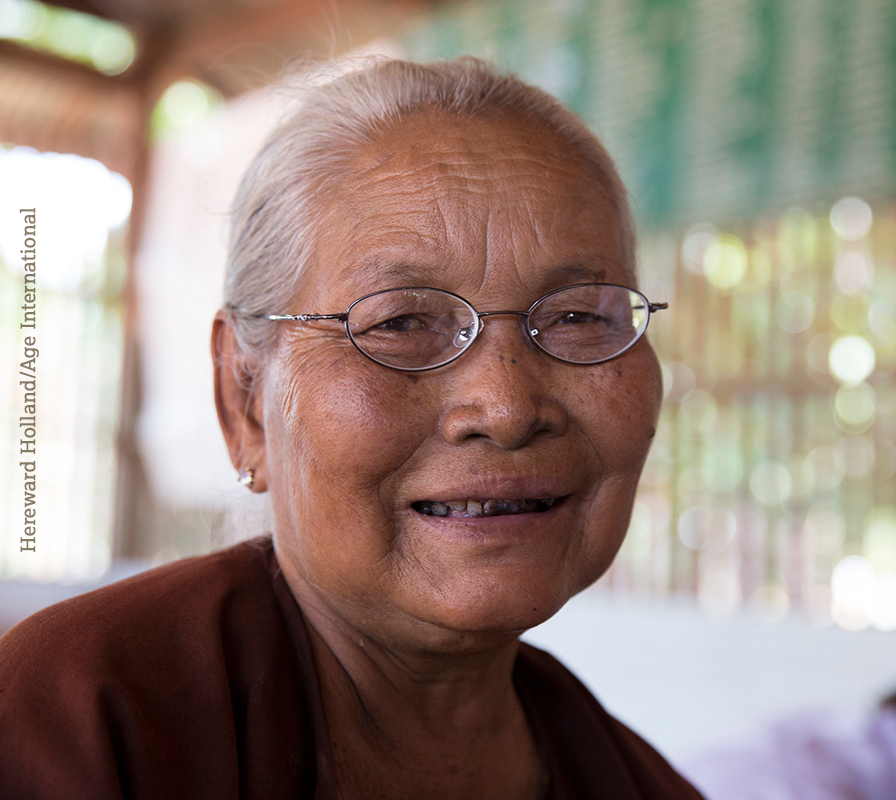Older activists across East Asia and the Pacific region, from Mongolia to the Philippines, will today join a global campaign calling for the increasing prevalence of diabetes to be tackled through screening, testing, treatment and education.
The actions, taking place on World Health Day, are part of HelpAge International’s Age Demands Action campaign mobilising older campaigners in more than 50 countries to draw attention to the challenges they face.
Without treatment, older people with diabetes are more at risk of developing complications and other non-communicable diseases than younger people.
East Asia and the Pacific is home to 1.6 billion people. There are more than 138.2 million people living with diabetes, and the number may rise to 201.8 million by 2035[1].
Diabetes is one of the four major non-communicable diseases (NCDs), along with cancer, cardiovascular disease (CVD) and chronic respiratory disease. Prevalence of diabetes increases with age in many countries. In China, diabetes is almost twice as common in people over 70 as it is those in their 50s[2].
Around 9 per cent of the world’s adults are thought to have diabetes[3] and, according to the World Health Organization (WHO), it will be the seventh leading cause of death globally by 2030[4].
“An early diagnosis is crucial for preventing chronic health problems”, said Clare Woodford, Health Policy Advisor at HelpAge International. “It can take a while for symptoms to show themselves and when they do, people are often unaware of the implications or have difficulties accessing healthcare”.
“Regular exercise and a healthier diet, low in sugar and salt, can not only reduce the risk of someone developing diabetes, but also help manage and reduce the symptoms among those who have it”, said Woodford.
The WHO estimates that 1.5 million people died as a direct result of type 2 diabetes in 2012 and more than 80 per cent of diabetes deaths occur in low- and middle-income countries[5].
The Sustainable Development Goals, adopted at the UN last September, commit member states to ‘ensure healthy lives and promote well-being for all at all ages’ and include a target on reducing mortality from NCDs. However, the extent to which older people are affected is still unclear.
“Much of the data on diabetes either ignores older people or doesn’t disaggregate by age”, said Toby Porter, Chief Executive Officer at HelpAge International. “For countries to monitor the progress of these commitments they need to gather comprehensive data on diabetes and other non-communicable diseases for people of all ages and to disaggregate this data by age and sex at a minimum”.
In Myanmar, HelpAge is working to strengthen the response to diabetes and other NCDs through diabetes screenings and training health staff in over 300 townships. HelpAge also works with nutritionists in Jamaica to inform older people on healthy eating.
Age Demands Action is a grassroots campaign challenging age discrimination in over 60 countries. This year two new campaign partners in Liberia and Nigeria are joining ADA for the first time.
The activities for World Health Day follow on from ADA actions on the International Day of Older People in October when activists from around the world came together to celebrate ageing and call for a convention protecting their rights.
For media enquiries contact:
Baralee Meesukh, Communications Manager, in Thailand on Tel: +66 (0) 53 225 440 Mobile: + 66 (0) 81 921 6462 Email: cee@helpageasia.org skype: baralee.meesukh
Panitee Nuykram, Public Relations Officer, on Tel: + 44 (0) 20 7148 7606. Email: panitee@helpageasia.org skype: panitee.nuykram
To find out more about the WHO’s World Health Day, this year focusing on diabetes, please visit: http://www.who.int/campaigns/world-health-day/2016/en/
Download the full press release with notes to editor (in PDF) here.
[1] International Diabetes Federation
[2] WHO SAGE, 2016 Naidoo N.
[3] WHO 2012 (based on diabetes prevalence of people aged over 18)
[4] Mathers CD, Loncar D. Projections of global mortality and burden of disease from 2002 to 2030. PLoS Med, 2006, 3(11):e442.
[5] World Health Organization. Global Health Estimates: Deaths by Cause, Age, Sex and Country, 2000-2012. Geneva, WHO, 2014.

